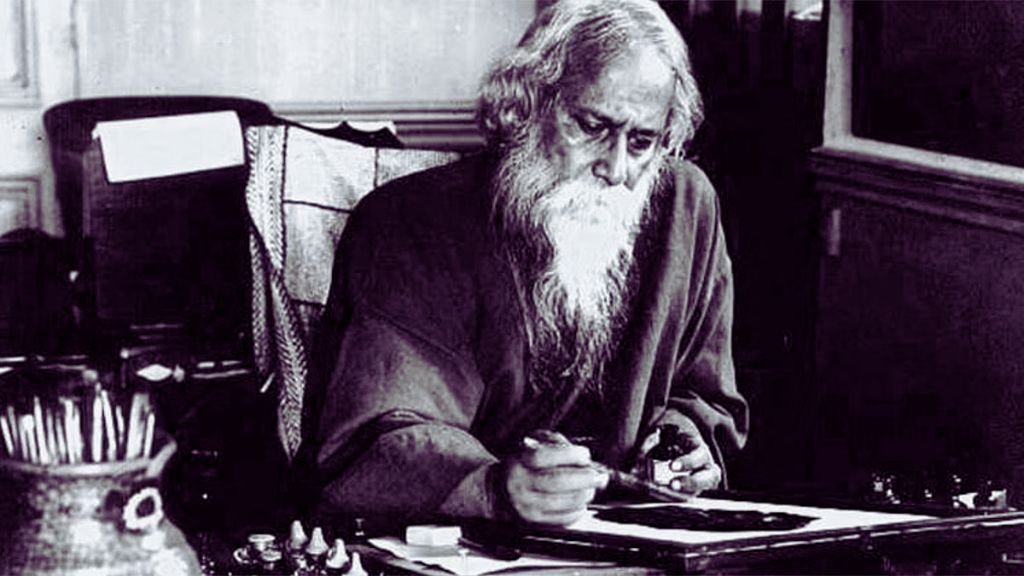Rabindranath Tagore, a towering figure in Indian literature and culture, was a polymath whose influence transcended borders. Born in 1861 in Calcutta, he reshaped Bengali literature and music, becoming the first non-European Nobel laureate in Literature in 1913.
Tagore’s poetry, music, and philosophy embodied the spirit of humanism and universalism, advocating for the synthesis of Eastern and Western ideals. His legacy continues to inspire generations worldwide, leaving an indelible mark on literature, music, and social reform.
10 Lines On Rabindranath Tagore
- Rabindranath Tagore was a famous Indian poet.
- He was born on May 7, 1861, in Kolkata, India.
- Tagore wrote many beautiful poems and songs.
- He also wrote stories, essays, and plays.
- He loved nature and often wrote about it in his works.
- Tagore’s most famous work is “Gitanjali,” a collection of poems.
- He was the first non-European to win the Nobel Prize in Literature in 1913.
- Tagore’s songs are part of India’s cultural heritage.
- He believed in the power of education and founded a school called Shantiniketan.
- Rabindranath Tagore’s writings inspire people all around the world.
| Also Read: 10 Lines About Sudha Murthy |
Essay On Rabindranath Tagore In 400 Words
Rabindranath Tagore was a very special person. He was not just a poet; he was also a philosopher and a great thinker. He was born in Kolkata, India, in the year 1861. He wrote many beautiful poems, stories, and songs that people still love and admire today.
Tagore loved nature very much. He often found inspiration in the beauty of the world around him. He wrote poems about flowers, trees, birds, and rivers. He believed that nature was like a friend who could teach us many important things about life.
One of Tagore’s most famous works is a song called “Jana Gana Mana,” which later became the national anthem of India. This song is sung with pride by people all over the country. Tagore also wrote another famous song called “Amar Shonar Bangla,” which is the national anthem of Bangladesh.
Tagore was not just a poet; he was also a philosopher who had many wise thoughts about life and society. He believed in the power of education to bring about positive change in the world. He started a school called Shantiniketan, which means “abode of peace,” where children could learn in a peaceful and natural environment.
Tagore believed in the importance of love and understanding between people. He wrote many stories and plays that teach us to be kind and compassionate towards others. He believed that if we treat each other with respect and kindness, the world would be a better place for everyone.
Tagore was a very talented person who did many different things in his life. Apart from writing poems and stories, he was also a painter and a musician. He loved to paint beautiful pictures and compose melodious songs.
Tagore received many honors and awards for his contributions to literature and music. In 1913, he became the first non-European to win the Nobel Prize in Literature for his book of poems called “Gitanjali,” which means “Song Offerings.” This was a great honor not only for Tagore but also for India.
Even though Tagore lived a long time ago, his teachings and writings are still relevant today. His ideas about love, nature, and education continue to inspire people all over the world. He taught us to appreciate the beauty of the world around us and to treat each other with kindness and respect.
In conclusion, Rabindranath Tagore was a truly remarkable person who made a lasting impact on the world through his poetry, philosophy, and teachings. He will always be remembered as one of the greatest poets and thinkers of all time.
| Also Read: My Father Essay 10 Lines In English |
Essay On Rabindranath Tagore In 600 Words
Rabindranath Tagore, a luminary of Indian literature, music, and art, transcended the boundaries of time and space to become a global icon. His multifaceted talents encompassed poetry, music, literature, and activism, earning him the title of “the Bard of Bengal.”
Rabindranath Tagore was born on May 7, 1861, in Calcutta, British India, into a distinguished Bengali family. His father, Debendranath Tagore, was a revered philosopher and leader of the Brahmo Samaj, a religious and social reform movement. Tagore’s early education was eclectic, influenced by both Indian and Western traditions. He was homeschooled and exposed to a wide range of subjects, including literature, history, and music.
Tagore’s literary journey began at an early age, and he started writing poetry in his teenage years. His early works were deeply influenced by the Vaishnava tradition and the Baul heritage of Bengal. However, he soon developed his unique style, characterized by lyrical beauty, profound spirituality, and universal humanism. Tagore’s poetry explored themes such as love, nature, spirituality, and the human condition, earning him widespread acclaim.
Among Tagore’s most celebrated works is “Gitanjali” (Song Offerings), a collection of poems that earned him the Nobel Prize in Literature in 1913, making him the first non-European to receive this honor. “Gitanjali” reflects Tagore’s spiritual quest and his profound connection with nature and humanity. Other notable works include “The Home and the World,” a novel that explores the complexities of love, nationalism, and freedom, and “Kabuliwala,” a poignant short story that explores the bonds of friendship across cultures.
Besides being a writer, Tagore was good at music and art too. He created lots of songs called Rabindra Sangeet, which are very important in Bengali culture. His music reflects the essence of Indian classical music while incorporating elements of folk traditions. Tagore’s artwork, including paintings and sketches, also exemplifies his artistic sensibility and spiritual depth.
Tagore was not only a prolific writer and artist but also a visionary educationist. In 1901, he founded Visva-Bharati, an experimental school and later a university, with the aim of fostering an environment where students could receive holistic education rooted in Indian culture and values while engaging with global ideas. Visva-Bharati became a center of learning where students from diverse backgrounds came together to explore the interconnectedness of knowledge and life.
Tagore was deeply engaged in the social and political issues of his time. He was a vocal critic of British colonialism and an advocate for Indian independence. However, his approach to nationalism was nuanced, emphasizing the importance of cultural exchange and universal humanism over narrow sectarianism. Tagore’s commitment to social justice and harmony is evident in his writings and his active involvement in social reform movements.
Rabindranath Tagore’s legacy extends far beyond his literary and artistic achievements. He remains a towering figure in Indian literature and culture, revered for his timeless wisdom and profound insights into the human condition. His ideas on education, nationalism, and spirituality continue to inspire generations of scholars, artists, and activists around the world. Tagore’s message of peace, harmony, and universalism is more relevant today than ever before, offering a beacon of hope in a world torn apart by conflict and division.
In conclusion, Rabindranath Tagore was not just a poet, musician, or educator; he was a Renaissance man whose genius encompassed multiple domains of human endeavor. His life and works continue to inspire and enrich our lives, reminding us of the power of creativity, compassion, and human connection. As we celebrate Tagore’s legacy, let us strive to embody the spirit of his teachings and work towards a more harmonious and enlightened world.

